80 Jaar Toni Morisson
De Afro-Amerikaans schrijfster Toni Morrison werd geboren op 18 februari 1931 in Lorain, Ohio. Zie ook mijn blog van 18 februari 2007 en ook mijn blog van 18 februari 2009 en ook mijn blog van 18 februari 2010. Toni Morisson viert vandaag haar 80e verjaardag.
Uit: The Bluest Eye
„Nuns go by as quiet as lust, and drunken men and sober eyes sing in the lobby of the Greek hotel. Rosemary Villanucci, our next-door friend who lives above her father’s cafe, sits in a 1939 Buick eating bread and butter. She rolls down the window to tell my sister Frieda and me that we can’t come in. We stare at her, wanting her bread, but more than that wanting to poke the arrogance out of her eyes and smash the pride of ownership that curls her chewing mouth. When she comes out of the car we will beat her up, make red marks on her white skin, and she will cry and ask us do we want her to pull her pants down. We will say no. We don’t know what we should feel or do if she does, but whenever she asks us, we know she is offering us something precious and that our own pride must be asserted by refusing to accept.
School has started, and Frieda and I get new brown stockings and cod-liver oil. Grown-ups talk in tired, edgy voices about Zick’s Coal Company and take us along in the evening to the railroad tracks where we fill burlap sacks with the tiny pieces of coal lying about. Later we walk home, glancing back to see the great carloads of slag being dumped, red hot and smoking, into the ravine that skirts the steel mill. The dying fire lights the sky with a dull orange glow. Frieda and I lag behind, staring at the patch of color surrounded by black. It is impossible not to feel a shiver when our feet leave the gravel path and sink into the dead grass in the field.
Our house is old, cold, and green. At night a kerosene lamp lights one large room. The others are braced in darkness, peopled by roaches and mice. Adults do not talk to us — they give us directions. They issue orders without providing information. When we trip and fall down they glance at us; if we cut or bruise ourselves, they ask us are we crazy. When we catch colds, they shake their heads in disgust at our lack of consideration. How, they ask us, do you expect anybody to get anything done if you all are sick? We cannot answer them. Our illness is treated with contempt, foul Black Draught, and castor oil that blunts our minds.“
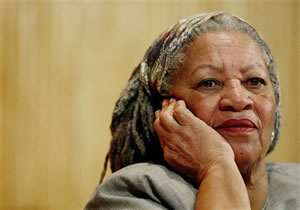
Toni Morrison (Lorain, 18 februari 1931)
De Amerikaanse schrijver Nick McDonell werd geboren op 18 februari 1984 in New York. Zie ook mijn blog van 18 februari 2009 en ook mijn blog van 18 februari 2010.
Uit: An Expensive Education
„Kenya-Somalia Border, 200X
That morning a young American named Michael Teak drove North through the rolling scrub on a mission for his government, which was at that time the most powerful in the world. A kite, hunting on well-traveled winds from the Indian Ocean, floated overhead as his Land Cruiser bumped slowly over the remote track. Teak was in no hurry to reach the village under the white sun of the afternoon. Evening would be cooler and, he hoped, calm.
It was a simple mission, really. Deliver some money and a cell phone to a rebel named Hatashil, take a look around. Too good to be true had been Teak’s first thought when he finished reading the file on Hatashil. Hatashil was a freedom fighter. An autodidact orphan warrior. A humanitarian and a leader. Teak was trained to be wary of those words, as if promise too bright was never fulfilled, ultimately betrayed. Daylight on colonial brick.
But Teak had been comfortably in-country for a year-and-a-half and also thought that maybe, it didn’t have to be that way. Or at least, he didn’t have to be that way. He wasn’t sure. This was his problem and as he drove deeper into the green and brown landscape he felt disconnected from it, and then alienated too from his car, his gun. It occurred to him that finally on the right kind of mission, he might be the wrong kind of guy. He chalked this up to nerves and drove on, which was what, he understood at age twenty five, a professional did.
There were five suitcases in the back seat. Cheap luggage for poor travelers, inelegant, plastic. They were Teak’s second cover. He stopped the truck and consulted his phone, checking his position against the village coordinates. On track, on time.
As he shifted back into gear, Teak noticed movement on the horizon. Through a gap in a stand of acacias far down the track, a dust cloud. It was the first dust he had seen in over a hundred miles and he resumed his drive at a faster pace. He lost sight of the cloud, caught sight again as it rose over the trees. At best a lunatic safari, at worst — Teak briefly recalled the tortures that had come to one of his predecessors, his jellies scooped out, his abdomen cut to bits on rusty blades. Tied to a tree and left to die. No reason to waste a bullet.“
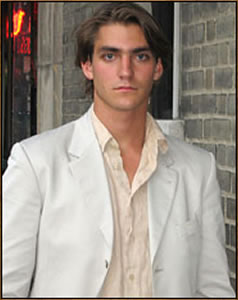
Nick McDonell (New York, 18 februari 1984)
De Nederlandse dichter Bart FM Droog werd geboren in Emmen op 18 februari 1966. Zie ook mijn blog van 18 februari 2008 en ook mijn blog van 18 februari 2009 en ook mijn blog van 18 februari 2010.
Back Home
Het leven raast
tussen steden
en terloopse slaapplaatsen
elke dag
een ander ontwaken
mijn huis
is waar
mijn lichaam is
in de steensteeg
van vervalstad
of in de luxe
van het dollarhotel
ben ik thuis
waar mijn lichaam
ook wezen mag.
Mens op planeet aarde
Europa, Azië, Afrika – ik verzamel
continenten werkwijs – ik wijs
toerisme af en waan me werker
in een wereld die naar rotting stinkt
ach, hoe mooi de sterren, hoe onbedorven
de planeten waar nooit mensen waren
met machines die aarde vraten, wateren
ontvisten en vergiftigen, ja voordien
‘k zou me moeten schamen, ‘k zou
zoveel excuses aan moeten bieden
maar aan wie o wie o wie.
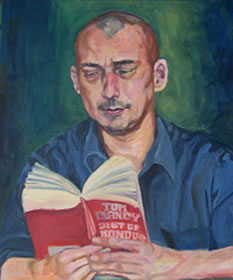
Bart FM Droog (Emmen, 18 februari 1966)
Portret door Cornelis van der Wal
De Nederlandse dichter,vertaler en schilder Huub Beurskens is geboren in Tegelen op 18 februari 1950. Zie ook mijn blog van 18 februari 2007 en ook mijn blog van 18 februari 2008. en ook mijn blog van 18 februari 2009 en ook mijn blog van 18 februari 2010.
De fles olijfolie
De olijven oogst men in de winter.
Al hadden we hun kern: werden
alleen maar onze duimen uitgeperst,
vergingen we al en bevatten niets dan de pijn.
Zíj triomferen. Ze blijken een en al verzameling
van zomerlicht te zijn. Als de druiven
die hen voorgingen, in de wijn. Ik
hoor een meisje zingen, ze slaat de tamboerijn,
negen anderen dansen onafgebroken achten.
Kan het leven zo oneindig zijn? Ja. Ik
kijk naar buiten. Kranteproppen waaien
uit gebroken ruiten. Deuren blijven klappen
voor onbedeelden die zo hologig zitten kleumen
dat zelfs de storm niet anders kan dan
hen bespelen als zijn instrumenten.
En het blijft maar sneeuwen. Sterven,
daar is niets op tegen. Maar een slecht bewind…
In de winter, een fles olie uit Toscane,
en ik, revolutionair gezind.
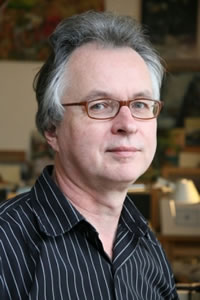
Huub Beurskens (Tegelen, 18 februari 1950)
De Duitse dichteres en schrijfster Elke Erb werd geboren op 18 februari 1938 in Scherbach in de Eifel. Zie ook mijn blog van 18 februari 2009 en ook mijn blog van 18 februari 2010.
Netz
1
Ja freilich folgt man einem Anreiz zu springen
lieber, und sei es als ein Sack-Leck Flöhe, ins Feld
(schau die tanzenden Samen – sehr kleine Kinder),
selbst als Regen! lieber
als gegangenen Wege,
oder gar Brücken! über Sümpfe! Sumpfbäche! Klüfte!
Bahnen für Handel & Wandel.
2
Andererseits geradeaus, des Wegs, woher, wohin,
pfeifend! Treidler! Das Dorf lag noch im Schlaf.
Die bleichen Straßen der Vorstadt. Ja, wieso? Trödelbleich!
Die geblähte, schmähliche, ziellose Tüte im Gras.
Wind. Reise, Reise und Wind.
Hier und da Menschen, zur Frühschicht.
Aber dort vorn ein Plural gequirlt. Eine Reise-
Gesellschaft? Morgenlicht auf den Rucksäcken?
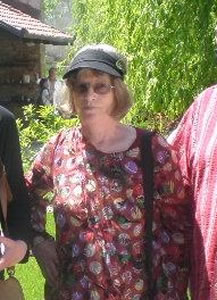
Elke Erb (Scherbach, 18 februari 1938)
De Vlaamse dichter en schrijver Gaston Burssens werd geboren in Dendermonde op 18 februari 1896. Zie ook mijn blog van 18 februari 2008 en ook mijn blog van 18 februari 2009 en ook mijn blog van 18 februari 2010.
Venus
In d’ijskoude vroege morgen
stapt een venus op ’t trottoir;
’t blonde kopje zonder zorgen
als een ordeloos boudoir.
Vroege werklui stappen dreunend
op het grauwe makadam;
hevig rinkelend rijdt, en kreunend
op de rails, een vroege tram.
Verder glijdt met korte stapjes
’t blondje met wat moe gelaat,
en ze hoort de vuile grapjes
van de werklui in de straat.
’t Venusdiertje trad voorzichtig
uit het zalig zondenest;
’t wipt de tram in en doorzichtig
nu naar huis de dorst gelest.
Vrouwtje is dood
Ik spreek van u tegen mijn hond
Hij luistert met gestrekte oren
Alsof hij u door mij kan horen
Alsof hij u in mij verstond
Toen hij zijn poot gebroken had
En gij hem schreiend hebt verbonden
Keek hij naar u met ogen nat
Van dankbaarheid als alle honden
Maar deze blik die hij mij geeft
Nu ik hem spreek van ons verleden
Dat in zijn hondenleven leeft
Is zijn blik die geen ander heeft
Zo met ons drie’n is hij tevreden.
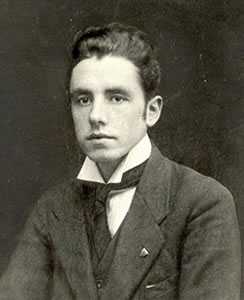
Gaston Burssens (18 februari 1896 – 29 januari 1965)
Gaston Burssens in 1917
De Griekse dichter en schrijver Níkos Kazantzákis werd geboren in Heraklion op 18 februari 1883. Zie ook mijn blog van 18 februari 2007 en ook mijn blog van 18 februari 2009 en ook mijn blog van 18 februari 2010.
Uit: The Greek Passion or Christ Recrucified (Vertaald door Jonathan Griffin)
“For an instant Manolios’s heart failed him, he turned to the door – it was closed; he looked at the three lit lamps and, under them, the icons loaded with ex-votos: Christ, red-cheeked, with carefully combed hair, was smiling; the Virgin Mary, bending over the child was taking no interest in what was happening under her eyes. Saint John the Baptist was preaching in the desert. He raised his eyes toward the vault of the church and made out in the half-light the face of the Almighty, bending pitilessly over mankind. He looked at the crowd about him; it was as if in the darkness he saw the gleam of daggers. The strident voice of old Ladas squeaked once more: “Let’s kill him!” At the same moment, violent blows were struck upon the door; all fell silent and turned toward the entrance; furious voices could be heard distinctly: “Open! Open!” “That’s the voice of father Fotis!” someone cried. “Yannakos’s voice,” said another; “the Sarakini have come to take him from us!” The door was shaken violently, its hinges creaked; there could be heard a great tumult of men and women outside. “open, murderers! Have you no fear of God?” came the voice of father Fotis, distinctly. Priest Grigoris raised his hands. “In the name of Christ,” he cried, “ I take the sin upon me! Do it, Panayotaros.” Panayotaros drew the dagger and turned to father Grigoris. “With your blessing, Father!” he asked. “With my blessing, strike!”
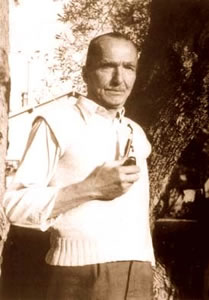
Níkos Kazantzákis (18 februari 1883 – 26 oktober 1957)
Zie voor nog meer schrijvers van de 18e februari ook mijn vorige blog van vandaag.
